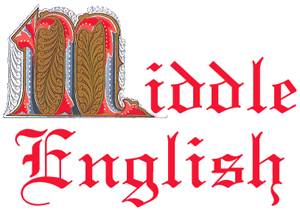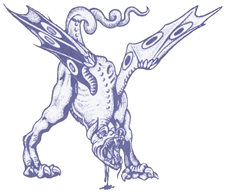|
|
|

Middle English Period (1066 to 1450)
The period of Middle English extended from the 12th century through the 15th. The influence of French and Latin upon the lexicon continued throughout this period, the loss of some inflections and the reduction of others accelerated, and many changes took place within the phonological and the grammatical systems of language.
William the Conqueror arrived to England on 1066, establishing the French Domination, that would endure various centuries. These invaders were originally called Danes (`Northmen') who settled the northern coast of France that was later called Normandy, during the 8th and 9th centuries. The Old English nobility was taken out of that place. The french that this Normans brought was stablished as the language of the aristocracy and government and English remained as the speech of the common people. It was a kind of bilingual state until about 1200, when many french words were added to English.
|
English |
French |
|
ox |
beef |
|
sheep |
mutton |
|
swine |
pork |
|
calf |
veal |
It was until 1362 when English regained its importance when it was ordered that all the lawsuits should be conducted in English. French was then a language for the nobility, and it was the Hundred Years' War (1337-1453) which ended this cultural domination, as French was the language of the enemy country and nationalism which forced to return English its position. Black Death (1349-50), which killed off 30% of the people, increased the economic importance of the labouring classes and with it the importance of their language.
As we have said, the Normans conquered England in 1066, as a result the English turned into the language of the lower classes. A lot of the structure, spelling and pronunciation that was left from Old English was lost during this period. There were no upper classes speaking English and preserving or teaching standard English. A lot of the complexity of the grammar from Old English disappeared. The declension of the noun was simplified by dropping the final n, and neutralizing all vowel endings to e. In the early period of Middle English, the influence from Old Norse reflected in words such as: egg, sister, window, sky and get. The Normans brought other additions to the vocabulary, about 900 words were added to the language before 1250. However, from 1250-1400 English adopted the greatest number of French words (40%), and of the nearly 10,000, 75% are still in use.

The dialect of the Middle English was called Midland. It came from the Mercian dialect mentioned in the Old English period. It became very important in countries that were center of university, economic and courtly life.
One of the divisions of Midland, was the East Midland, which was oftenly used in government offices of London and later contributed to the direct development of the Modern English language.
One of the principal contributors to the evolution of English was Chaucer, who helped English Language to develop and acquire its modern form.